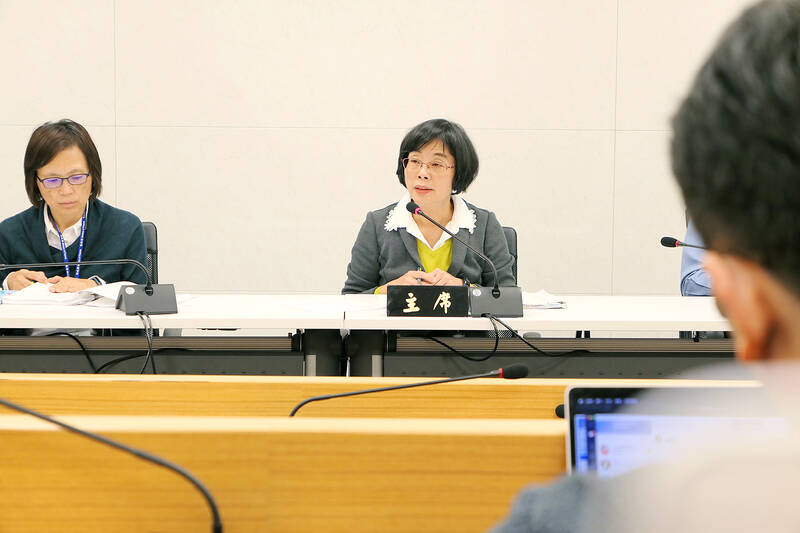Surplus tax revenue last year reached NT$495 billion (US$16.25 billion), beating the government’s target by 18.2 percent, mainly due to hefty gains from corporate and personal income taxes, the Ministry of Finance said yesterday.
There was a 12 percent increase to NT$3.22 trillion in tax revenue for the whole of last year, even though tax revenues for last month shrank 15 percent from a year earlier amid an ongoing economic slowdown, the ministry said.
Department of Statistics Deputy Director-General Chen Yu-feng (陳玉豐) said impressive GDP growth in 2021 helped boost corporate and personal incomes last year because of time lags in dividend distribution.

Photo: Wu Chia-jung, Taipei Times
Corporate income tax revenue last month declined 10.4 percent year-on-year, while personal income tax revenue fell 5.1 percent, as global inflation and monetary tightening hit local manufacturing firms, the backbone of the nation’s exports.
Tax revenue gained public attention recently as pundits called for stimulus measures using excess tax revenue to expand private consumption and offset this year’s poor exports.
Altogether, revenue generated from stamp, liquor, house, land, business and entertainment taxes all more than doubled last year from a year earlier, Chen said.
A quick recovery in domestic demand and a low comparison base in 2021 made the improvement more conspicuous, she said.
The nation earned record-high tax revenue last year, even as securities transaction tax revenue tumbled 36.3 percent to NT$175.6 billion, Chen said, adding that the sum still ranked the second highest in history.
The local stock market has in the past few years gained regional and global importance, thanks to the Taiwanese semiconductor firms’ leading posistions.
At the same time, land value gain tax revenue dropped 15.4 percent annually to NT$93 billion last year, in line with a 13.5 percent drop in taxable cases to 89,820, Chen said.
Sales tax revenue proved another drag because the government cut tax rates on several imported oil and raw materials to ease inflation pressure, she said.

Nvidia Corp chief executive officer Jensen Huang (黃仁勳) on Monday introduced the company’s latest supercomputer platform, featuring six new chips made by Taiwan Semiconductor Manufacturing Co (TSMC, 台積電), saying that it is now “in full production.” “If Vera Rubin is going to be in time for this year, it must be in production by now, and so, today I can tell you that Vera Rubin is in full production,” Huang said during his keynote speech at CES in Las Vegas. The rollout of six concurrent chips for Vera Rubin — the company’s next-generation artificial intelligence (AI) computing platform — marks a strategic

REVENUE PERFORMANCE: Cloud and network products, and electronic components saw strong increases, while smart consumer electronics and computing products fell Hon Hai Precision Industry Co (鴻海精密) yesterday posted 26.51 percent quarterly growth in revenue for last quarter to NT$2.6 trillion (US$82.44 billion), the strongest on record for the period and above expectations, but the company forecast a slight revenue dip this quarter due to seasonal factors. On an annual basis, revenue last quarter grew 22.07 percent, the company said. Analysts on average estimated about NT$2.4 trillion increase. Hon Hai, which assembles servers for Nvidia Corp and iPhones for Apple Inc, is expanding its capacity in the US, adding artificial intelligence (AI) server production in Wisconsin and Texas, where it operates established campuses. This

Garment maker Makalot Industrial Co (聚陽) yesterday reported lower-than-expected fourth-quarter revenue of NT$7.93 billion (US$251.44 million), down 9.48 percent from NT$8.76 billion a year earlier. On a quarterly basis, revenue fell 10.83 percent from NT$8.89 billion, company data showed. The figure was also lower than market expectations of NT$8.05 billion, according to data compiled by Yuanta Securities Investment and Consulting Co (元大投顧), which had projected NT$8.22 billion. Makalot’s revenue this quarter would likely increase by a mid-teens percentage as the industry is entering its high season, Yuanta said. Overall, Makalot’s revenue last year totaled NT$34.43 billion, down 3.08 percent from its record NT$35.52

PRECEDENTED TIMES: In news that surely does not shock, AI and tech exports drove a banner for exports last year as Taiwan’s economic growth experienced a flood tide Taiwan’s exports delivered a blockbuster finish to last year with last month’s shipments rising at the second-highest pace on record as demand for artificial intelligence (AI) hardware and advanced computing remained strong, the Ministry of Finance said yesterday. Exports surged 43.4 percent from a year earlier to US$62.48 billion last month, extending growth to 26 consecutive months. Imports climbed 14.9 percent to US$43.04 billion, the second-highest monthly level historically, resulting in a trade surplus of US$19.43 billion — more than double that of the year before. Department of Statistics Director-General Beatrice Tsai (蔡美娜) described the performance as “surprisingly outstanding,” forecasting export growth